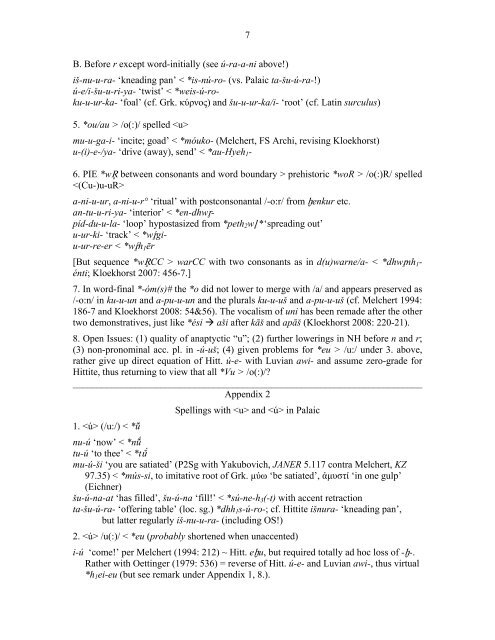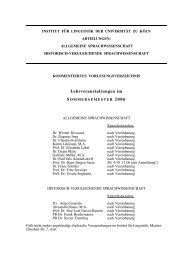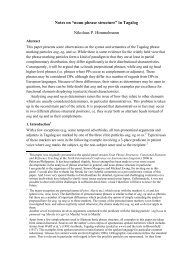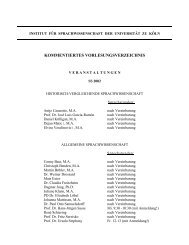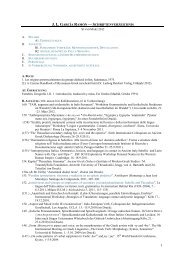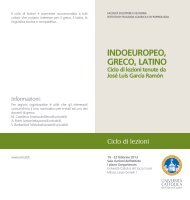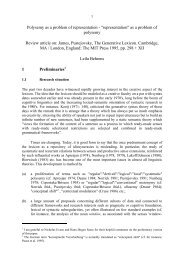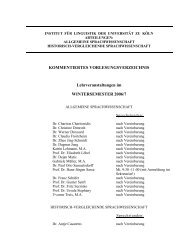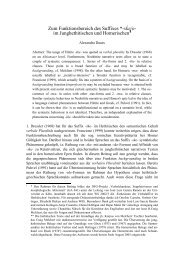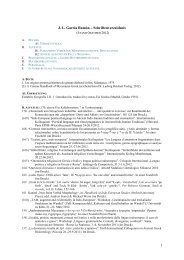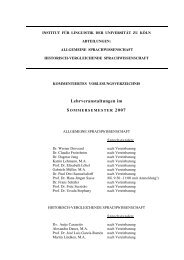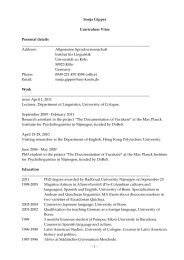Topics in Anatolian Historical Grammar Prof. Dr. H. Craig Melchert
Topics in Anatolian Historical Grammar Prof. Dr. H. Craig Melchert
Topics in Anatolian Historical Grammar Prof. Dr. H. Craig Melchert
Create successful ePaper yourself
Turn your PDF publications into a flip-book with our unique Google optimized e-Paper software.
7<br />
B. Before r except word-<strong>in</strong>itially (see ú-ra-a-ni above!)<br />
iš-nu-u-ra- ‘knead<strong>in</strong>g pan’ < *is-nú-ro- (vs. Palaic ta-šu-ú-ra-!)<br />
ú-e/i-šu-u-ri-ya- ‘twist’ < *weis-ú-roku-u-ur-ka-<br />
‘foal’ (cf. Grk. κύρνος) and šu-u-ur-ka/i- ‘root’ (cf. Lat<strong>in</strong> surculus)<br />
5. *ou/au > /o(:)/ spelled <br />
mu-u-ga-i- ‘<strong>in</strong>cite; goad’ < *móuko- (<strong>Melchert</strong>, FS Archi, revis<strong>in</strong>g Kloekhorst)<br />
u-(i)-e-/ya- ‘drive (away), send’ < *au-Hyeh 1 -<br />
6. PIE *w between consonants and word boundary > prehistoric *woR > /o(:)R/ spelled<br />
<br />
a-ni-u-ur, a-ni-u-r° ‘ritual’ with postconsonantal /-o:r/ from ḫenkur etc.<br />
an-tu-u-ri-ya- ‘<strong>in</strong>terior’ < *en-dhwpíd-du-u-la-<br />
‘loop’ hypostasized from *peth 2 w *‘spread<strong>in</strong>g out’<br />
u-ur-ki- ‘track’ < *wgiu-ur-re-er<br />
< *wh 1 ēr<br />
[But sequence *wCC > warCC with two consonants as <strong>in</strong> d(u)warne/a- < *dhwnh 1 -<br />
énti; Kloekhorst 2007: 456-7.]<br />
7. In word-f<strong>in</strong>al *-óm(s)# the *o did not lower to merge with /a/ and appears preserved as<br />
/-o:n/ <strong>in</strong> ku-u-un and a-pu-u-un and the plurals ku-u-uš and a-pu-u-uš (cf. <strong>Melchert</strong> 1994:<br />
186-7 and Kloekhorst 2008: 54&56). The vocalism of uni has been remade after the other<br />
two demonstratives, just like *ési aši after kāš and apāš (Kloekhorst 2008: 220-21).<br />
8. Open Issues: (1) quality of anaptyctic “u”; (2) further lower<strong>in</strong>gs <strong>in</strong> NH before n and r;<br />
(3) non-pronom<strong>in</strong>al acc. pl. <strong>in</strong> -ú-uš; (4) given problems for *eu > /u:/ under 3. above,<br />
rather give up direct equation of Hitt. ú-e- with Luvian awi- and assume zero-grade for<br />
Hittite, thus return<strong>in</strong>g to view that all *Vu > /o(:)/?<br />
________________________________________________________________________<br />
Appendix 2<br />
Spell<strong>in</strong>gs with and <strong>in</strong> Palaic<br />
1. (/u:/) < *u<br />
nu-ú ‘now’ < *nu<br />
tu-ú ‘to thee’ < *tŭ<br />
mu-ú-ši ‘you are satiated’ (P2Sg with Yakubovich, JANER 5.117 contra <strong>Melchert</strong>, KZ<br />
97.35) < *mús-si, to imitative root of Grk. μύω ‘be satiated’, ἀμυστί ‘<strong>in</strong> one gulp’<br />
(Eichner)<br />
šu-ú-na-at ‘has filled’, šu-ú-na ‘fill!’ < *sú-ne-h 3 (-t) with accent retraction<br />
ta-šu-ú-ra- ‘offer<strong>in</strong>g table’ (loc. sg.) *dhh 1 s-ú-ro-; cf. Hittite išnura- ‘knead<strong>in</strong>g pan’,<br />
but latter regularly iš-nu-u-ra- (<strong>in</strong>clud<strong>in</strong>g OS!)<br />
2. /u(:)/ < *eu (probably shortened when unaccented)<br />
i-ú ‘come!’ per <strong>Melchert</strong> (1994: 212) ~ Hitt. eḫu, but required totally ad hoc loss of -ḫ-.<br />
Rather with Oett<strong>in</strong>ger (1979: 536) = reverse of Hitt. ú-e- and Luvian awi-, thus virtual<br />
*h 1 ei-eu (but see remark under Appendix 1, 8.).


